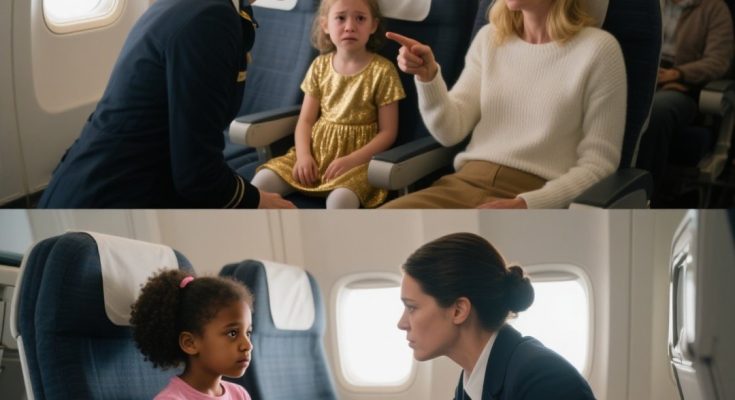The cabin of American Airlines Flight 1857 was humming with routine as the Boeing 737 prepared to depart Philadelphia for Chicago. Among the early morning travelers, eleven-year-old Zora Elena Rockefeller sat in first class, her small frame dwarfed by the plush leather seat. Her fingers traced the faded inscription inside her well-worn copy of To Kill a Mockingbird:
“To my Zora, may you always find the courage to stand for what’s right.”
She lifted her gaze from the page, unaware that the words she carried from her late mother were about to echo in a different, far more immediate way.
Across the aisle, Harrison Whitfield, a sharply dressed investment banker, shot a glance of thinly veiled disdain at the girl. When the flight attendant offered him assistance with his seating, he demanded Zora be moved, convinced that a young black girl traveling alone did not belong in first class.
The chief flight attendant, Marian Delaney, a veteran of over thirty years, maintained her calm exterior, though her senses prickled. Something in the air had shifted—the tension subtle yet undeniable.
Moments later, Marian reached for the passenger manifest, and her hands froze. The name “Zora Elena Rockefeller” stared back at her from the page. The clipboard slipped from her grasp, papers fluttering like startled birds across the aisle. The hum of the plane seemed to fade, replaced by the collective gasp of passengers who turned, startled, to see what had happened. Even Harrison Whitfield froze, mid-complaint, tugging nervously at his tie.
Zora, however, remained perfectly poised. Her chin lifted slightly, mirroring the proud posture she had learned from her father, Dr. Marcus Rockefeller. She returned to her book as if nothing had happened, though beneath her calm, a storm of embarrassment, anger, and weary recognition swirled. It shouldn’t have taken a famous last name for her to be acknowledged.
To understand how an ordinary flight became a crucible of confrontation and reflection, one must look back to Philadelphia International Airport, just two hours earlier.
There stood Marcus Rockefeller, his face lined with grief and the heavy shadow of illness. Six months had passed since the death of his wife, Alenora, and now Marcus himself faced a daunting prognosis. Yet, despite the weight of personal loss, he prepared his daughter for the journey alone, teaching her the family motto: conduct oneself with dignity and grace, no matter the circumstances.
Zora boarded with confidence. “I know the protocol,” she said with a faint smile, earning nods from staff. But the flight itself would test more than protocol.
Harrison Whitfield’s discomfort grew until he demanded Zora be removed from first class—a request not born of rules but prejudice. Marian, steady as ever, refused. Captain Robert Chen intervened, his tone polite yet firm, upholding the girl’s rightful seat. The contrast between professionalism and bias became painfully evident.

As the plane cruised, the initial tension shifted. Harrison, confronted by his own assumptions, began to see Zora not as an anomaly, but as a remarkable young girl carrying both personal grief and the weight of a storied lineage. Their conversation, tentative at first, unfolded with a strange intimacy: literature, loss, resilience, and the quiet dignity of a child shaped by tragedy.
Zora spoke of her mother’s teachings and her father’s illness, humanizing herself beyond the Rockefeller name. Harrison, listening, began to realize that his assumptions—rooted in ignorance and privilege—were both hollow and cruel.
Upon landing in Chicago, Zora reunited with Aunt Josephine, whose home provided sanctuary from the turmoil of the day. Life continued — hospital visits, academic achievements, cultural engagements — yet the flight remained etched in memory. Zora’s friendship with Harrison deepened, bridging social divides and challenging both to grow beyond their preconceptions.
The incident on Flight 1857 became more than a mere seating dispute; it was a catalyst for reflection and change. It exposed the lingering prejudices that persist even in the most privileged spaces and forced a confrontation with race, identity, and legacy. For Zora, it was a reminder that dignity often must be claimed, not assumed. For Harrison, it was a sudden awakening to blind spots he had never acknowledged.
By the time the passengers disembarked, the lesson lingered like a quiet hum through the cabin. True respect, it became clear, transcends names, titles, and appearances. It demands seeing others in their full humanity.
Eleven-year-old Zora Elena Rockefeller had quietly reminded everyone aboard that legacy is not just inherited—it is lived.
And sometimes, it takes courage to claim the place you deserve.



